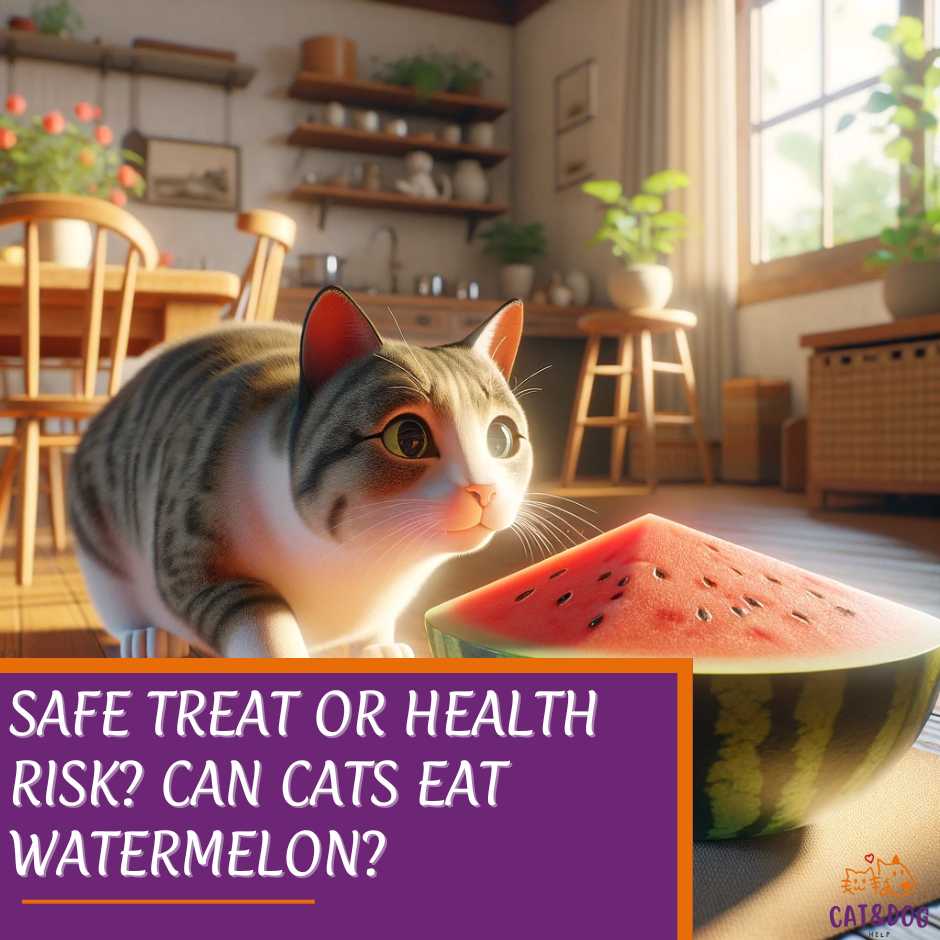Have you ever sat there munching on a juicy slice of watermelon, only to have your feline friend eyeing you with that all-too-familiar look of curiosity?
You might have wondered, “Can cats eat watermelon?”
Can Your Cat Enjoy Watermelon? Absolutely!
You’re not alone in this; a surprising percentage of cat owners are keen on sharing their snacks with their pets.
Let’s unwrap the mystery of cats and watermelons.
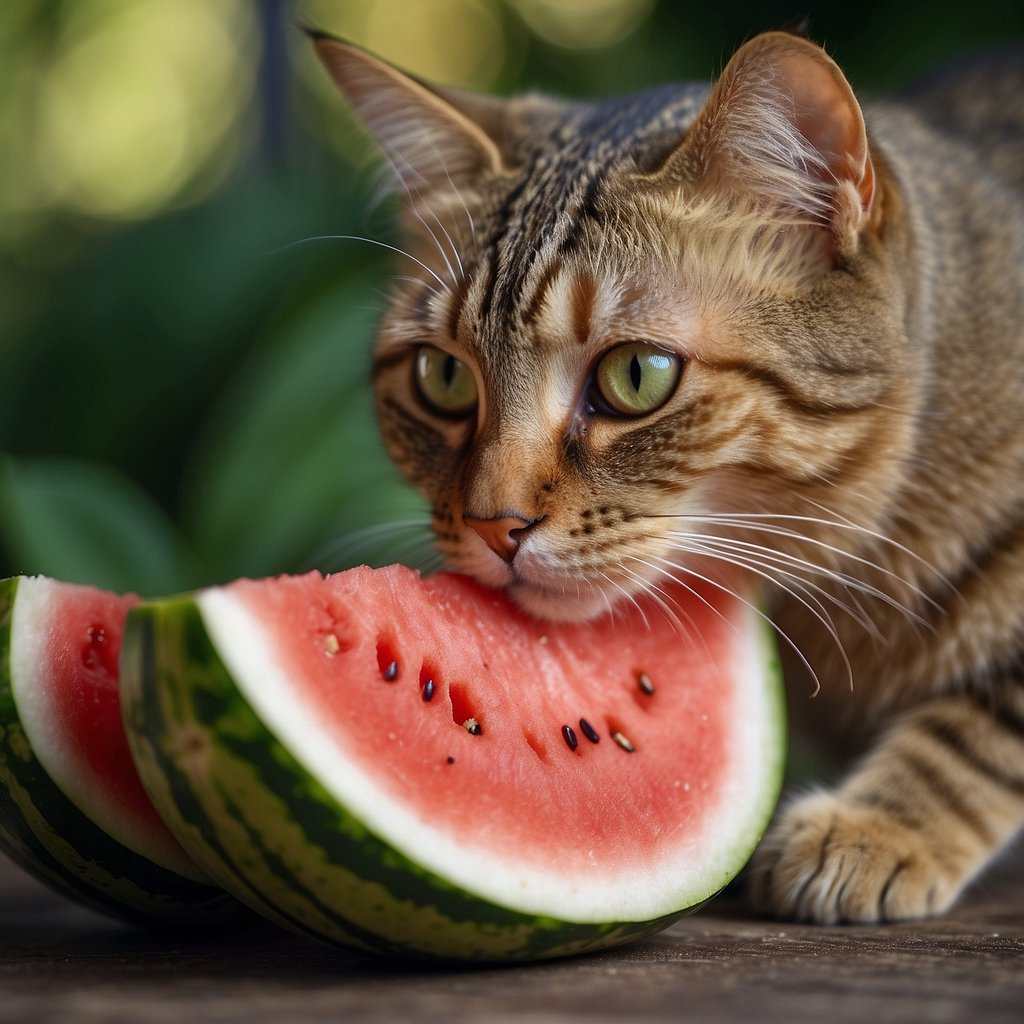
Imagine a hot summer day, you’re feeling generous, and you offer a small piece of watermelon to your cat. Lo and behold, they seem to like it!
But before making it a regular treat, it’s important to know if watermelon fits into a cat’s diet. Cats are obligate carnivores, and their nutritional needs are specific. (1)
While watermelon is packed with water and nutrients beneficial to humans, cats process foods differently.
The short answer is that cats can eat watermelon, but it should only be given to them occasionally as a small treat like any other Fruit Snacks for Cats, rather than a regular part of their diet.
While an occasional small piece of watermelon flesh could be okay, it comes with caveats regarding sugar content and potential risks for cats with special dietary needs.
Watermelon is non-toxic to cats and can be given as a treat from time to time. If you give your cat watermelon, it should be seedless.
Watermelon seeds contain trace amounts of cyanide which is toxic to cats. (2)
Key Takeaways
- Cats can eat watermelon in moderation, but it is not a necessary part of their diet.
- Watermelon provides hydration but also contains sugar, which is not ideal for cats, especially those with diabetes or weight issues.
- Consulting with a veterinarian is advisable before introducing watermelon or any human food into your cat’s diet.
Comprehensive Nutritional Profile of Watermelon
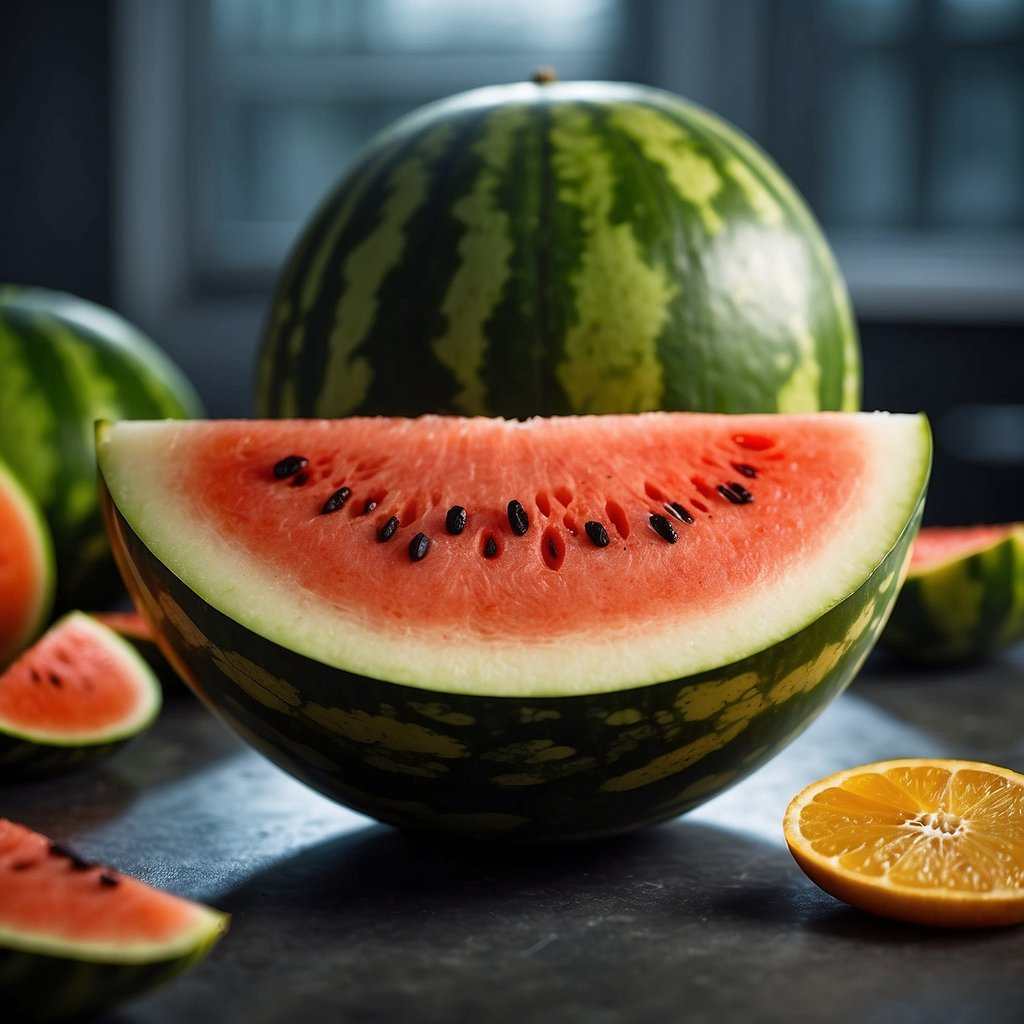
Have you ever wondered what’s in that juicy bite of watermelon you love so much? It’s not just water and sugar; it’s a treasure trove of nutrients. Check it out:
Nutritional Components:
- Vitamins: Watermelon is loaded with vitamins A and C. Vitamin A is essential for good vision and immune function, while vitamin C is known for its antioxidant properties, helping to combat free radicals. (3)
- Minerals: Potassium is present in modest amounts, aiding in muscle and nerve functions. (4)
- Fiber: Although fiber content is fairly low, it’s still present and benefits your digestive system.
- Water Content: About 90% of watermelon is water, making it incredibly hydrating on those sweltering days.
Health Benefits for Humans:
- Hydration: Great for quenching thirst and rehydrating your body.
- Antioxidants: Lycopene, the red pigment in watermelon, is an antioxidant that may reduce the risk of certain diseases. (5)
Now you might be thinking, “But how does this translate for my kitty?” Well, cats are a different story. They don’t process fruits the same way we do.
Your furry friend can’t taste sweetness, and their bodies aren’t designed to extract the same benefits from watermelon as yours. In fact:
Feline Nutrition Comparison:
- Taste: Cats lack the taste receptors for sweetness, so the flavor isn’t something they’ll enjoy like we do.
- Nutritional Benefit: The nutrients in watermelon don’t offer the same perks because cats have evolved to fulfill their dietary needs with a high-protein, meat-based diet.
Remember, human foods, including watermelon, should never replace a balanced diet tailored for your cat.
So while a tiny treat of watermelon won’t harm your cat, it doesn’t contribute significantly to their nutritional needs. Stick to quality cat food for their main diet—your feline pal will thank you for it!
Understanding “Can Cats Eat Watermelon?”
Ever wondered why your feline friend turns up their nose at your veggie platter?
Cats are not just picky eaters; they’re obligate carnivores. What does this mean for your kitty’s diet? Let’s dive in and explore.
Biological Needs:
As obligate carnivores, cats have a biological need for a diet that’s high in protein and low in carbohydrates. Unlike us, your cat thrives on meat, and there’s a good reason for this:
- Protein: Cats require a wealth of amino acids which are found abundantly in animal tissue. (6)
- Taurine: One such essential amino acid is taurine, which they cannot produce in sufficient quantities themselves. (7)
- Carbohydrates: Cats have little need for carbs, and their bodies aren’t well-equipped to digest a carb-heavy diet. (8)
Diverse Dietary Perspectives:
While all cats share this carnivorous trait, different breeds may react differently to varied diets.
You might think, “Well, a little bit of watermelon can’t hurt, right?”
While it’s true that watermelon isn’t toxic to cats, it’s also true that it doesn’t provide them with the necessary nutrients found in meats, including animal products like tuna.
Here’s a quick synopsis of why a meat-centric diet is important for your furry little carnivore:
- Essential Nutrients: These nutrients are quintessential for optimal feline health and can’t be found in plant-based foods.
- Case Study: Studies show that cats on a diet more attuned to their carnivorous nature tend to maintain better health. Cats fed a low-protein, high-carb diet have been observed to develop health issues more frequently than those on a high-protein diet.
Remember, just because your cat can eat something doesn’t mean they should. Stick to what’s best for their carnivorous needs, and save the watermelon for your own snack time!
Detailed Analysis of Health Implications for Cats
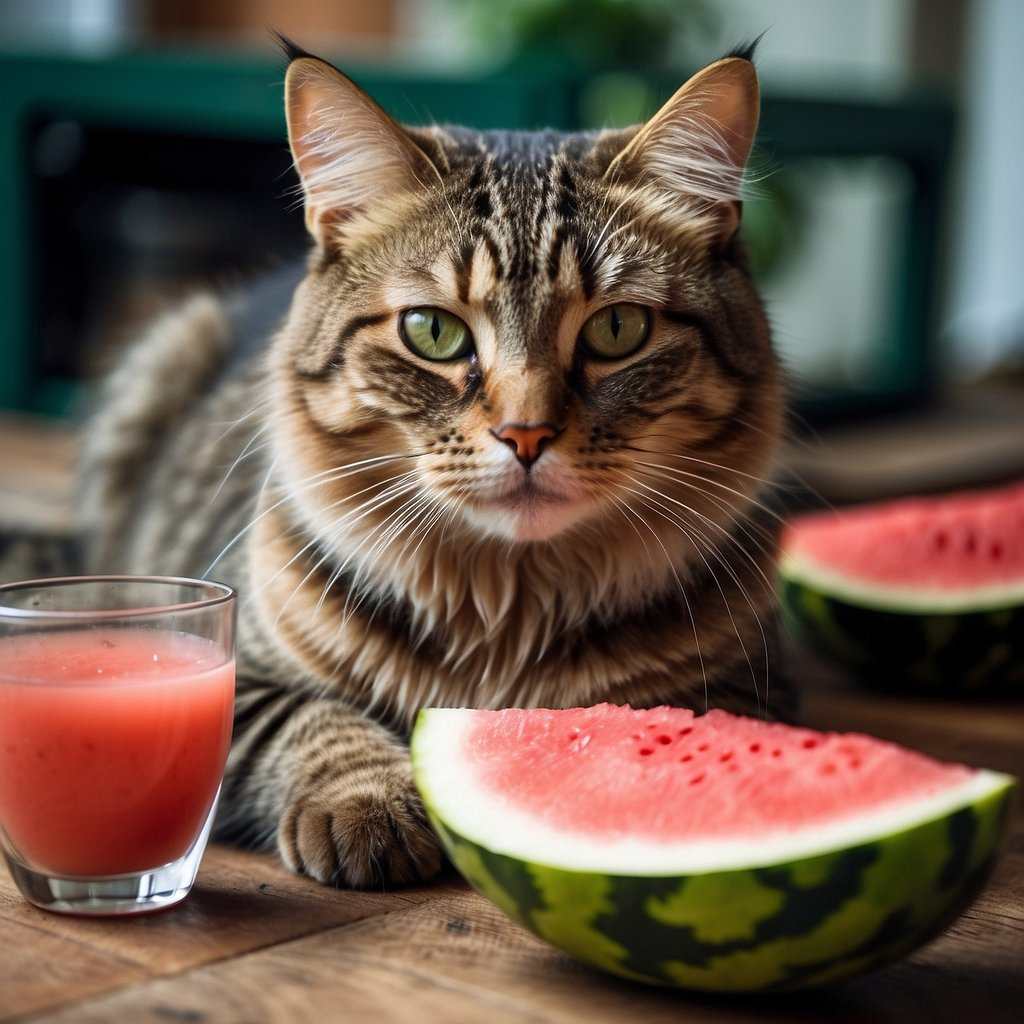
Hydration Benefits
You might wonder if there’s anything beneficial about cats consuming watermelon.
Well, one possible perk is the fruit’s high water content, which can help keep kitties hydrated, particularly during those scorching summer days.
Imagine your furry friend having a splash of watermelon to cool off—quite the picture, right?
However, it’s not all sunshine and catnip…
Risks: The Sugar Factor
While hydration is crucial, the sugar content in watermelon isn’t a trivial matter. Your cat doesn’t need extra sugar.
Truth be told, too much can contribute to obesity and potentially lead to diabetes; such sweet treats should be handed out sparingly.
Special Dietary Needs
Let’s take a look at Mister Whiskers, a cat with diabetes. After a watermelon treat, his blood sugar levels might spike—not ideal for his health condition.
Expert Opinions and Case Studies
Veterinarians generally agree that frisky felines might enjoy an occasional watermelon treat, but they also emphasize moderation. It’s like the cat’s version of a cheat day, okay for some, but not for all.
Feline Nutrition Insights
When I chatted with a feline nutritionist, the focus was on balance. “Cats are obligate carnivores.
Their diet should be meat-centric,” they explained. Watermelon can be a nice change, but it doesn’t offer much nutrition for your cat.
Remember, whether it’s a treat or mealtime, keeping your cat’s diet mainly meaty is the goal. A nibble of watermelon might be okay now and then, but let’s keep those juicy cubes a rare delicacy.
Exploring Potential Benefits and Risks
Benefit: Hydration, especially in hot climates
Summer days can make you crave a juicy slice of watermelon, right? Well, in moderation, your feline friend might enjoy this hydrating healthy snack too!
Being made of about 92% water, watermelon can help keep cats hydrated, which is a genuine perk during those scorching hot days.
Remember, though, cats get most of their hydration from their meat-based diet, so watermelon should just be a refreshing extra for extra hydration!
Risk: Sugar content and its effect on obesity and diabetes in cats
Don’t let that sweet face fool you into overfeeding sweet treats!
Watermelon does contain sugar, and too much isn’t purr-fect for your kitty. It could contribute to obesity and even increase the risk of diabetes, so let’s keep it to a minimum, okay?
Addressing Insufficient Details for Cats with Special Needs
Case study: Let’s chat about Molly, the diabetic cat. When she snuck a bite of watermelon, her blood sugar levels spiked unexpectedly.
It’s a heads-up to all cat parents that treats like watermelon need to be given cautiously to cats with conditions like diabetes.
Case Studies and Veterinarian Insights
Expert opinion: A vet might say, “An occasional small piece of watermelon as a treat? Sure, why not!”
But they’ll be quick to remind you that cats’ primary diet should be meat-based and that treats should only be a tiny part of their dietary landscape.
Adding Depth to Generalized Information
Interview excerpt with a feline nutritionist: “Yes, watermelon is non-toxic to cats, but it’s more about balance and understanding your cat’s dietary needs.
A slice here and there? Not a big deal. Just don’t replace their regular meals with it.”
Step-by-Step Guide on Safe Feeding Practices
- Remove those pesky seeds and rind; they’re not cat-friendly.
- Stick to a 1-inch cube to keep those sugar levels in check.
Providing Specific Advice for Different Types of Cats
- Kittens: They’re growing, so keep it simple with kitten food.
- Senior cats: They have their quirks; consult your vet first.
- Health issues: Personalize their diet, watermelon might not fit in.
Special Considerations for Cats with Dietary Restrictions
Navigating a diet for cats with allergies? Stick to vet-approved meals and leave the watermelon off their menu. Your vet can help create a meal plan that suits their sensitive needs.
Alternatives and Variations in Cat Diet
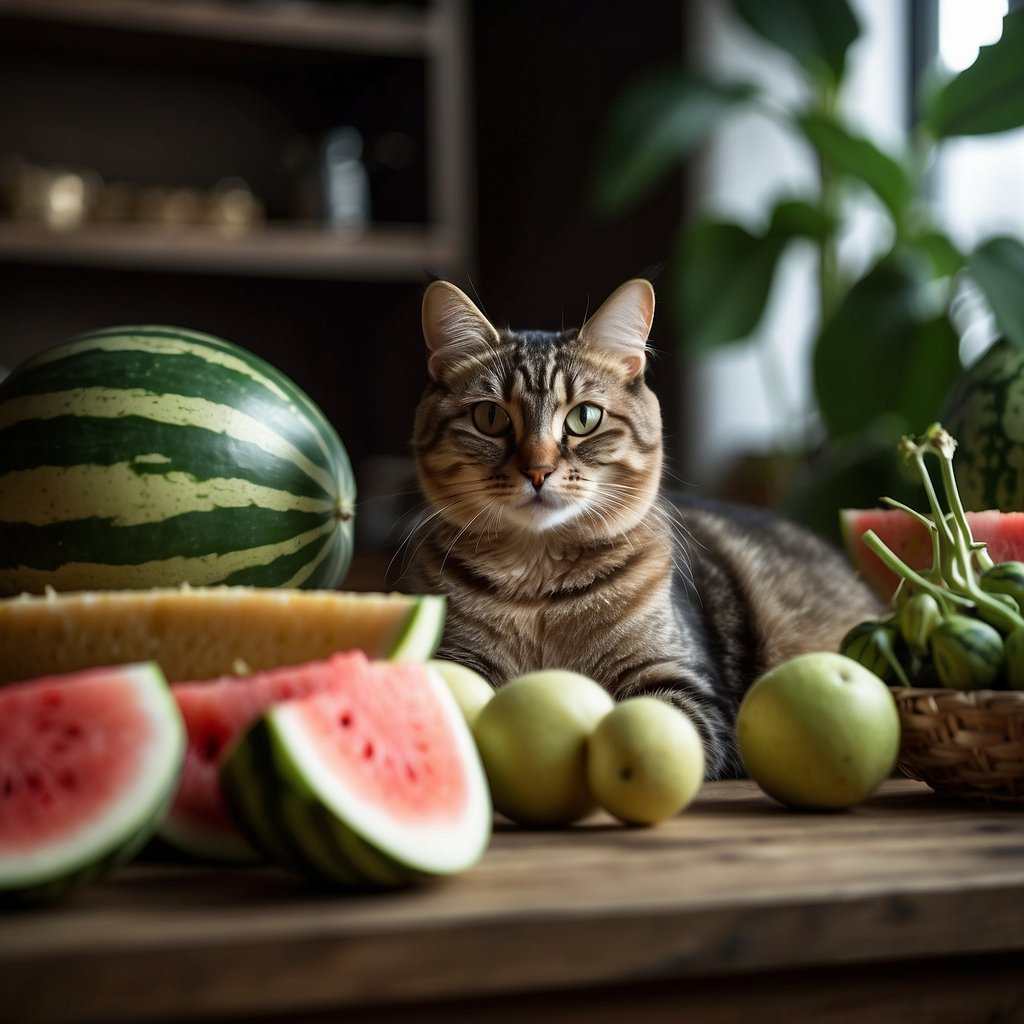
Have you ever watched your cat turn its nose up at dinner, and wondered what other safe snack options are out there?
Cats are known for their finicky eating habits, but there’s a variety of cat-safe fruits and vegetables that might just pique their interest!
Here’s a list of cat-friendly alternatives:
- Fruits: Apples (peeled and core removed), bananas (in moderation), blueberries
- Vegetables: Steamed carrots, green beans, and baked squash
Every cat is an individual, and their dietary preferences can vary. You might find that your furry friend goes wild for cantaloupe but ignores blueberries. Isn’t it fascinating how they have their tastes just like us?
In a recent survey, it turns out that freeze-dried meat treats top the chart as the paw-ferred snack among various cat populations.
But before you start a fruit and veggie buffet, remember the importance of a balanced diet. Fruits and veggies should only be a small part of your cat’s overall diet.
However, if you’re looking for healthy cat treats, consider adding vegetables like celery and strawberries to their diet.
Celery can be a great nutritional addition to your cat’s diet, along with other vegetables such as zucchini, green bell peppers, carrots, peas, spinach, broccoli, and pumpkin.
For a quick visual on a balanced cat diet, picture this:+—————-+——————–+——————-+ | Protein (Main) | Fruits/Vegetables | Supplements | +—————-+——————–+——————-+ | 80-90% | 5-10% | As recommended | +—————-+——————–+——————-+
The key is to use such treats to enhance your cat’s meal times without overdoing it. And with those percentages in mind, you’ll keep your buddy meowing for more without compromising their health.
Isn’t it great to know you can spice up your cat’s meals and still keep them healthy?
So next time you’re enjoying a juicy slice of watermelon, it’s okay to share a little with your kitty—just remember to remove the seeds and rind. Who knew mealtime could be such an adventure?
Expert Opinions and Veterinary Advice
Hey there, cat enthusiasts! Ever wondered if you can share a slice of your favorite summer treat with your feline friend?
Well, you’re not alone, and vet approved insights might just satisfy your curiosity.
Veterinary Insights
Cats can indeed eat watermelon in moderation. However, it’s not a dietary staple. Here’s a quick list of what the professionals say:
- Watermelon is safe for cats.
- It should only be a treat, not a meal replacement.
- Remove all seeds to prevent choking hazards.
Practical Tips
If you’re considering introducing watermelon to your cat, strike up a conversation with your vet first. They can provide personalized advice based on your kitty’s health profile. Here’s what to chat about:
- Any dietary restrictions your cat may have.
- Potential allergic reactions to watch for.
- The correct serving size for your cat’s weight and health status.
“Ask the Vet” Q&A
Got a funny story about your cat’s quirky eating habits. Share it with your vet; they’ve heard it all! Plus, they can probably explain those oddball preferences.
When to Seek Professional Advice
Not sure if watermelon is okay for your cat? Here’s a quick checklist:
- Your cat has diabetes or obesity.
- Your cat is allergic to certain foods.
- You’ve noticed any digestive issues post-snack.
Remember, while it might be cute to watch your kitty chomp on a juicy chunk of watermelon, it’s best to treat it as an occasional snack.
Keep the portions small, and always go seedless! If you’ve got any doubts or your cat is acting a bit off, it’s better to check in with your vet.
They’re the experts, after all, and they’re there to help keep your feline in tip-top shape!
Quick Recap
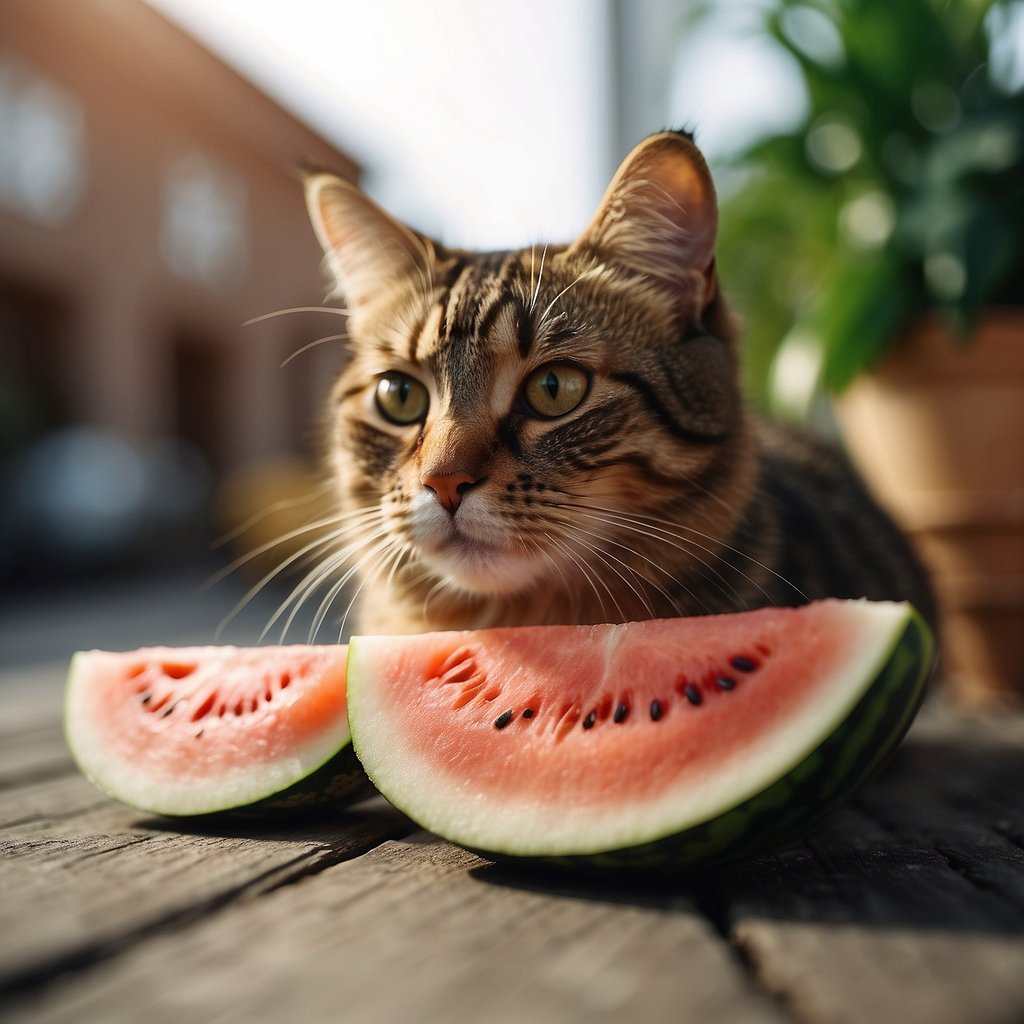
Can Your Cat Enjoy Watermelon? Absolutely! You’re safe to share a bit of watermelon with your feline pal. Here’s a quick rundown of what we’ve discovered:
- Safety First: A tiny slice is fine, just remember seeds and rind are a no-go.
- Sugar Check: While not high in sugar, too much can upset your kitty’s tummy.
- Prescription Diets: If your cat is on one, stick to it. Watermelon could interfere.
- Moderation Matters: Treat watermelon as a sometimes snack, not a staple.
Did You Know?
- Watermelon is a hit-or-miss treat; some cats may love it, others might snub it.
Feeding Tips: When giving watermelon to your cat, consider these points:
| Aspect | Recommendation |
| Portion Size | Small chunks |
| Frequency | Occasionally |
| Preparation | Seedless and rind-free |
In giving watermelon to your cat, you’re sharing a hydrating snack, especially during those hot summer months.
But, don’t forget to consult your vet, especially if your cat has health issues or dietary restrictions. Keep it to a sliver of watermelon and watch for any unusual reactions.
Your cat’s health always comes first. Giving your pet too much watermelon could cause an upset stomach or diarrhea.
There are not many health benefits when cats do eat watermelon. They may get some hydration, potassium, or vitamin C from the fruit, but “the benefit is likely to be minimal,” according to PetMD.
A cat is more likely to get the necessary nutrients in their regular diet.
And there you have it—your cat can indeed sample some watermelon. Just remember to keep it light, keep it safe, and when in doubt, ask the pros (yeah, the vets!). Enjoy the snack bonding time with your purry friend!
Frequently Asked Questions
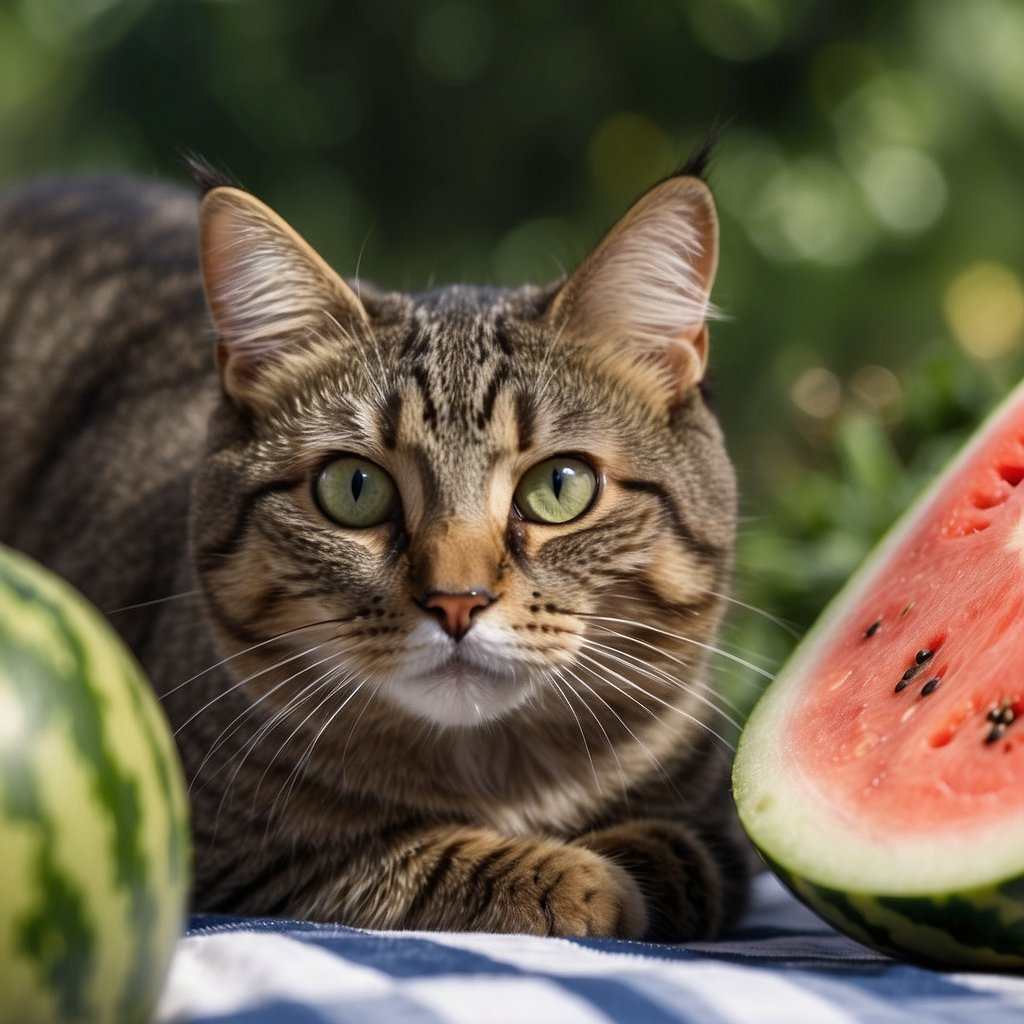
Can kittens eat watermelon safely?
When it comes to your little furball, it’s best to be cautious.
Kittens can nibble on watermelon flesh in very small amounts, but because their digestive systems are still developing, it’s wise to introduce any new food slowly and watch for any adverse reactions.
Is it healthy for a cat to eat watermelon as part of its daily diet?
Watermelon is not necessary for your cat’s diet and should only be treated as an occasional snack.
Cats are obligate carnivores, and their primary nutrition should come from protein-rich meat.
How much watermelon can I give my cat as a treat?
Keep it to a small bite or two. Watermelon is mainly water and sugar, so moderation is key to preventing any tummy upset or unnecessary weight gain.
Can watermelon cause diabetes in cats?
Feeding your cat large amounts of watermelon regularly might contribute to obesity, which can be a risk factor for diabetes. So, it’s important to offer watermelon sparingly.
Are there any breeds of cats that should avoid watermelon?
No specific cat breeds need to steer clear of watermelon, but individual cats with health issues such as diabetes should avoid sugary treats altogether.
Can watermelon help with my cat’s digestion?
Watermelon can provide hydration and fiber, which might aid digestion, but this should not replace a vet-recommended diet tailored to your cat’s digestive health.
- Where to find the most trustworthy real money casinos - August 7, 2025
- Online Casinos That Approve PayPal: The Ultimate Overview - August 7, 2025

